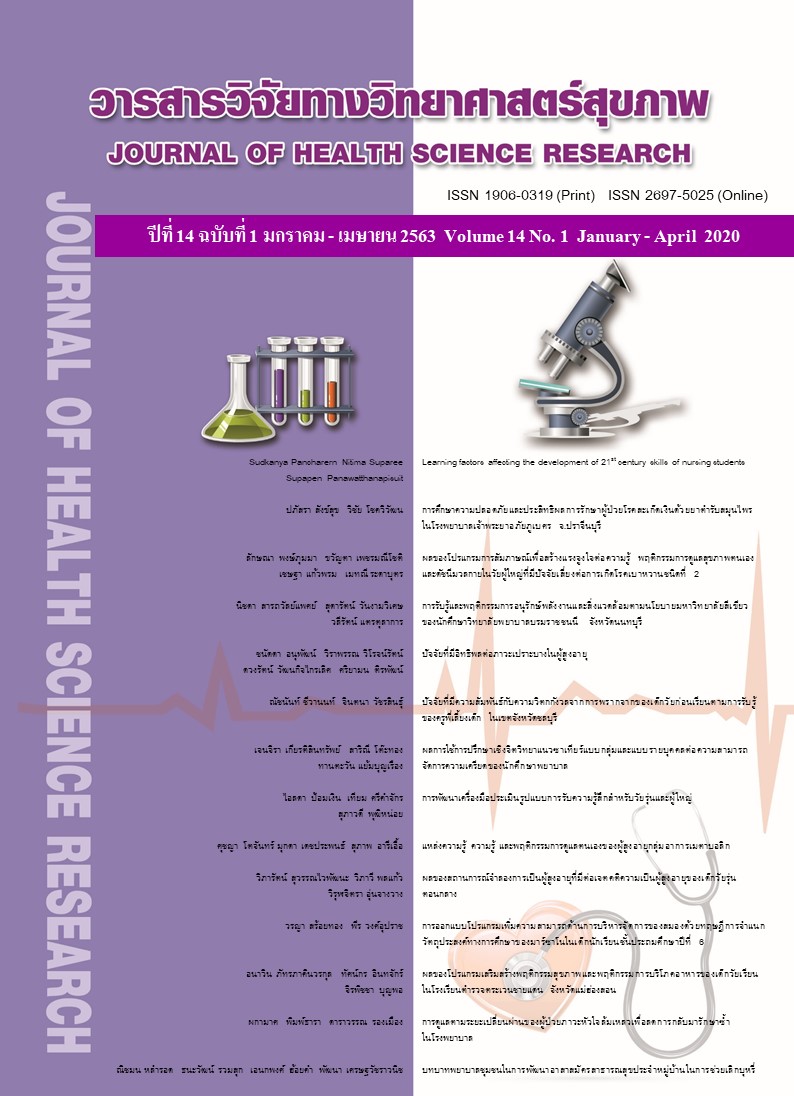ผลการใช้การปรึกษาเชิงจิตวิทยาแนวซาเทียร์แบบกลุ่มและแบบรายบุคคลต่อความสามารถจัดการความเครียดของนักศึกษาพยาบาล
Main Article Content
บทคัดย่อ
บทนำ: การปรึกษาเชิงจิตวิทยาแนวซาเทียร์เป็นวิธีที่ช่วยให้ผู้รับการปรึกษาสามารถจัดการกับความเครียดได้ดีขึ้น โดยกระบวนการให้การปรึกษาทำได้ทั้งแบบกลุ่มและแบบรายบุคคล ซึ่งแบบกลุ่มเป็นกระบวนการปรึกษาเชิงจิตวิทยาที่นำกระบวนการกลุ่มมาใช้ร่วมด้วย เพื่อเพิ่มประสิทธิภาพของการให้การปรึกษา วัตถุประสงค์การวิจัย: เพื่อศึกษาเปรียบเทียบผลของการใช้การปรึกษาเชิงจิตวิทยาแนวซาเทียร์แบบกลุ่มกับแบบรายบุคคลต่อความสามารถจัดการความเครียดของนักศึกษาพยาบาล
วิธีการวิจัย: การวิจัยเชิงทดลองโดยใช้แบบแผนการทดลองการสุ่มสี่กลุ่มแบบโซโลมอน กลุ่มตัวอย่างคือ นักศึกษาหลักสูตรพยาบาลศาสตรบัณฑิต ชั้นปีที่ 1 ปีการศึกษา 2560 ที่มีความเครียดระดับสูง จำนวน 32 คน เครื่องมือที่ใช้ในการทดลอง คือ โปรแกรมการปรึกษาเชิงจิตวิทยาแนวซาเทียร์แบบกลุ่มและแบบรายบุคคล เก็บรวบรวมข้อมูลด้วยแบบประเมินความเครียดของโรงพยาบาลสวนปรุง และแบบประเมินความสามารถจัดการความเครียดทีปรับปรุงมาจากแบบประเมินความสามารถจัดการความเครียดของ Jalowiec วิเคราะห์เปรียบเทียบความสามารถจัดการความเครียดก่อนและหลังการได้รับการปรึกษาโดยใช้สถิติทดสอบ paired t-test และวิเคราะห์เปรียบเทียบความสามารถจัดการความเครียดระหว่างกลุ่มการทดลองและกลุ่มควบคุมโดยใช้สถิติทดสอบ One-way ANOVA
ผลการวิจัย: ความสามารถจัดการความเครียดของนักศึกษาทั้ง 4 กลุ่มไม่แตกต่างกันอย่างมีนัยสำคัญทางสถิติที่ระดับ .05 แสดงว่า รูปแบบของการให้การปรึกษาและการทดสอบก่อนหลังไม่มีผลต่อความสามารถจัดการความเครียด ดังนั้น จึงเลือกใช้วิธีการให้การปรึกษาเชิงจิตวิทยาแนวซาเทียร์แบบกลุ่มที่ไม่ต้องมีการทดสอบก่อนรับการปรึกษา เพราะใช้เวลาน้อยที่สุด
สรุปผล: จากข้อค้นพบนี้ ชี้ให้เห็นว่า วิธีการให้การปรึกษาเชิงจิตวิทยาแนวซาเทียร์แบบกลุ่มที่ไม่ต้องมีการทดสอบก่อนรับการปรึกษาสามารถนำไปใช้กับนักศึกษาพยาบาลชั้นปีที่ 1 ที่มีความเครียดระดับสูงได้
Downloads
Article Details
บทความที่ได้รับการตีพิมพ์เป็นลิขสิทธิ์ของวิทยาลัยพยาบาลบรมราชชนนี จังหวัดนนทบุรี
ข้อความที่ปรากฏในบทความแต่ละเรื่องในวารสารวิชาการเล่มนี้เป็นความคิดเห็นส่วนตัวของผู้เขียนแต่ละท่านไม่เกี่ยวข้องกับวิทยาลัยพยาบาลบรมราชชนนี จังหวัดนนทบุรี และคณาจารย์ท่านอื่น ในวิทยาลัยฯ แต่อย่างใด ความรับผิดชอบองค์ประกอบทั้งหมดของบทความแต่ละเรื่องเป็นของผู้เขียนแต่ละท่าน หากมีความผิดพลาดใด ๆ ผู้เขียนแต่ละท่านจะรับผิดชอบบทความของตนเองแต่ผู้เดียว
เอกสารอ้างอิง
Limsuwan N, Limsuwan N. Satir: Psychotherapy and self-development. Bangkok: Chulalongkorn University Printing House; 2013. (in Thai).
Laohawirapap S. The effect of using the belief in karma in counseling along the Satir model on the coping ability of AIDS caregivers. [Thesis]. Chiang Mai: Chiang Mai University; 2005. (in Thai).
Kornnoom S, Vachiradilok P. Changes of families that serve family therapy based on the Satir concept: In case of teenage children having anti-behavior. Journal of Behavioral Science. 2016;22(1):109-22. (in Thai).
Azai T. The results of group counseling according to the Satir model on the goal setting of undergraduate students of Rajamangala University of Technology Lanna Chiang Mai. [Thesis].Chiang Mai: Chiang Mai University; 2008. (in Thai).
Sakulphong N, Chuchom O, Taephan N. The results of psychiatric group counseling emphasizing Satir concepts on the mental health power of female amphetamine addicts who are in rehabilitation phase: Mixed-method research. Suan Prung Journal. 2015;31(3):16-31. (in Thai).
Limwattanachai P. The results of Satir’s psychiatric group counseling on self-congruence of university students. [Thesis]. Bangkok: Chulalongkorn University; 2013. (in Thai).
Jansod T. Spouses treatment based on the Satir concept in alcohol dependence patients, psychiatric hospital Nakhon Ratchasima Rajanagarindra. Journal of Mental Health Community of Thailand. 2013;1(1):49-61. (in Thai).
Ratanawijit S, Chamnian M. Effects of applying the Satir model on confidence in avoiding premature sexual intercourse in a female secondary school grade 1 students in urban areas of Nakhon Pathom Province. Kuakarun Journal of Nursing. 2017;24(1):102-17. (in Thai).
Singkhorn O, Seeherunwong A, Kanjanakaroon R, Panyadee W. Effects of the mental health education program using Satir based model on depression in Thai women with depression. The Journal of Psychiatric Nursing and Mental Health. 2016;30(3):21-35. (in Thai).
Longthong N, Chowsilpa S, Tapanya P. Effects of using Satir model program on coping ability of the youth affected by AIDS. The Journal of Human Sciences. 2010;11(1): 21-29. (in Thai).
Kongsuk P, Piyawattakoon N, Chutangkorn P, Chaiyamee M. Effects of family counseling on schizophrenic patients by using Satir 's concept. Journal of the Psychiatric Association of Thailand. 2007;52(4):402-11. (in Thai).
Piddocke S. The Self: Reflections on its nature and structure according to the Satir Model. The Satir Journal. 2010;4(1):109–55.
Banmen J. Satir transformational systemic therapy. Palo Alto: Science and Behavior Books, Inc; 2008.
Banmen J. The Satir model: Yesterday and today. Contemporary Family Therapy, 2002;24:7-22.
Boromarajonani College of Nursing Changwat Nonthaburi. 2014 student guidance activity report. Guidance Student Department; 2017. (in Thai).
Boromarajonani College of Nursing Changwat Nonthaburi. 2015 student guidance activity report. Guidance Student Department; 2017. (in Thai).
Boromarajonani College of Nursing Changwat Nonthaburi. 2016 student guidance activity report. Guidance Student Department; 2017. (in Thai).
Boromarajonani College of Nursing Changwat Nonthaburi. 2017 student guidance activity report. Guidance Student Department; 2017. (in Thai).
Kamket W. Research methodology in behavioral science. 3 rd ed. Bangkok: Chulalongkorn University Printing House; 2012. (in Thai).
Mahatnirankun S, Pumpaisanchai W, Tapanya P. Creating the Suan Prung Stress Test. Bulletin of Suan Prung. 1997;13:1-20. (in Thai).
Jalowiec A. Confirmatory factor analysis of the Jalowiec Coping Scale. In: Waltz CF, Strickland OL, editors. Measurement of nursing outcomes: measuring client outcomes. New York: Springer; 1988. p. 287-308.
Limsuwan N, Piyawatkul N, Arunpongpaisal S. Satir model. Journal of the Psychiatric Association of Thailand 2007;52:1-7. (in Thai)
Kateman P. Knowledge of psychiatric disorders and behavioral problems: group counseling. [Internet]. 2007 [cited 2017 Sep 15]; Available from: www.psyclin.co.th. (in Thai).
Wongwanich S, Wiratchai N. Thesis counseling guidelines. 2nd ed. Bangkok: Center for Textbooks and Academic Documents, Faculty of Education, Chulalongkorn University; 2007. (in Thai).


